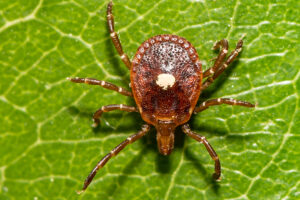Tick bites can render you allergic to red meat. This comes from the alpha-gal syndrome, which is a type of food allergy. It is a tick with the name of Lone Star tick that transmits this syndrome in the southeastern United States.
Deer carries the Lone Star tick into other parts of the US. The bite of the tick transfers a sugar molecule called alpha-gal into the person’s body. Subsequently the person develops a sensitivity to red meat, like beef, pork and lamb. Red meat membranes are rich in the sugar alpha-gal. The allergy can also be directed against other mammal-related products like milk protein. Often the person is unaware of this type of allergy, alpha-gal syndrome. In this case people continue to get exposed to red meat and mammal products, and the immune reactions become more severe over time. Anaphylactic reactions that are not due to food allergies have a high probability to be due to alpha-gal syndrome.
More details about the alpha-gal syndrome
Alpha-gal is the abbreviation for Galactose-alpha-1,3-galactose, which is a carbohydrate. It is part of most mammalian cell membranes, except for primates. The immune system in humans recognizes it as a foreign body and produces anti-alpha-gal antibodies. It is the bite of the lone star tick in North America or the castor bean tick in Sweden that can start the allergy to alpha-gal. If a person has frequent anaphylactic reactions, the physician should think of alpha-gal syndrome, which could be the underlying cause.
Sensitization of the human host
When the lone star tick bites mice, rabbits or deer it takes up alpha-gal sugar. Subsequently, when the tick bites a human, the alpha-gal sugar is injected into the human host together with its saliva. This alarms the immune system and antibodies are produced. When the human host later consumes meals with red meat, the body reacts to the previous sensitization to alpha-gal sugar by the tick bite. The antibody response to alpha-gal sugar from further red meat meals becomes even stronger than before. The only relief for human host from immune reactions is to switch to a diet that is free of red meat.
Allergic symptoms
The alpha-gal allergy can manifest itself by skin rashes, welts, skin itchiness, swelling, shortness of breath, headaches, belly aches, diarrhea and vomiting. In serious cases an anaphylactic reaction can occur, which in some cases can be lethal.
Protein allergies versus carbohydrate allergies
Until 2009 medical science believed that allergies would only be due to proteins. One such example are allergic reactions to peanuts. It is the peanut protein that can cause allergies. Subsequently, the alpha-gal allergy became known, which involves the sugar galactose-alpha-1,3-galactose. This was the first sugar molecule that researchers could demonstrate to mount an allergic reaction, from which the human host could turn sick.
Conclusion
The Lone Star tick in the southeastern US carries the sugar galactose-alpha-1,3-galactose (for short alpha-gal) which originates from bites of mammals that are not primates (cattle, pigs and lambs). When the tick bites a human, the immune system produces antibodies against alpha-gal. This can produce skin rashes, welts, skin itchiness, swelling, shortness of breath, headaches, belly aches, diarrhea and vomiting. But when the person recovers from the tick bite, a lifelong sensitivity against reed meats remains. Every time a sensitized person consumes a red meat meal the same symptoms, as originally experienced from the tick bite, return.
Abstinence from red meat
The only remedy for the alpha-gal syndrome is to abstain from red meat. The cell membranes of the muscle of red meat contain the sugar alpha-gal. Seafood, chicken, eggs and turkey meats are OK for consumption. But the patient has to be diligent about not making any dietary mistakes. If intermittent red meat exposure continues, a more severe allergy can develop. These have the name of “anaphylactic reactions”, where the patient is in danger of suffocating or even die from it.






